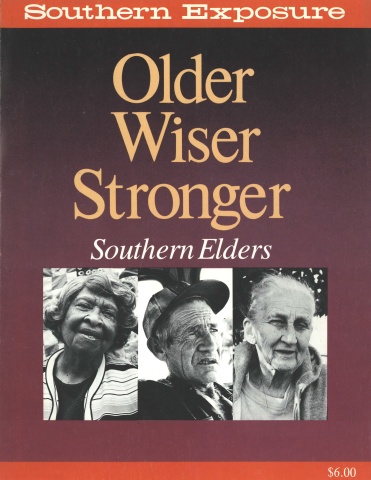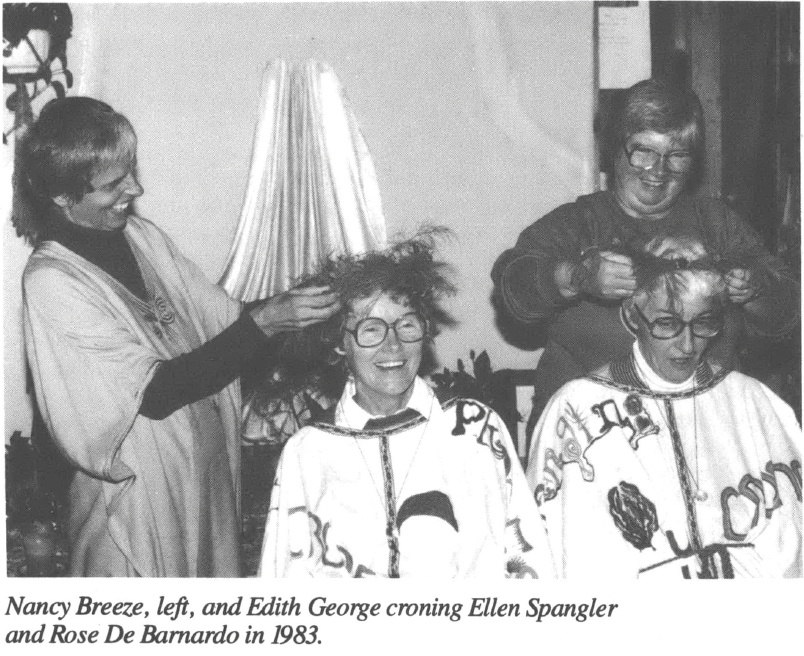
This article originally appeared in Southern Exposure Vol. 13 No. 2/3, "Older Wiser Stronger: Southern Elders." Find more from that issue here.
crone*
(krōn) n.
1. obsolete, an ugly, withered old woman.
2. a long-lasting, wise old woman.
"That movie could have been better," Sallie Ann said, pulling on the door handle.
I followed her, "You can say that a-..."
"HAPPY BIRTHDAY!" shouted a mountain inside the Unitarian Church.
I stood in the doorway, wanting to shrink from the loud voices swirling around me. I glanced longingly at the quiet parking lot behind me. Finally I looked at the floor. No, there wasn't a trap door!
Gradually the mountain became the individual feces of my friends. I was still startled and embarrassed, but retreat no longer seemed imperative.
"Happy birthday!" came the chorus, less intensely this time.
Rosalee stepped forward. "Welcome to your revolutionary fiftieth birthday party!" she smiled.
"Revolutionary?"
"Revolutionary! We're turning this ageist culture upside down when we celebrate getting older."
I had to agree with her, remembering how Jack Benny always claimed to be only 39.
"Why don't you be first in line for the potluck?" Rosalee gestured to a table at the side of the room.
I was delighted to step from the limelight and walk to the casserole-laden table. But I couldn't seem to concentrate on the food. I picked up a plate and spooned some salad onto it.
Then I just stood there until someone directed me to what turned out to be the head table. On the wall behind it hung a huge sign: "Happy Birthday, Nancy." I was relieved to see Aida and Betty grinning at me. I wasn't the oldest one in the room.
I pulled out a folding chair, glad to sit my shaky self down. When I looked at my plate, I was surprised to find my dinner consisted primarily of black olives from the top of the salad. I don't even like black olives. My stomach was too knotted up to care.
I tried to relax. My thoughts went back to earlier in the evening — it seemed a very long time ago. After the movie, Sallie had said she needed to get something from Connie, who was helping decorate for a dance at the church. I had noticed as I stepped from the VW that this decorating committee seemed to possess an awful lot of cars.
Pat's touch on my shoulder returned me to the present. "We have to go outside for a few minutes." By now I figured that nothing could shock me. Glad to be given something to do, I followed her out the door. While we talked outdoors, I wondered what was happening inside.
Soon we returned, to find a huge cardboard cake decorated with crepe paper sitting on the floor in the center of the room. Just then rousing music burst from the piano, and a young woman sprang from the "cake."
I tried to show some enthusiasm, but I had no idea who this person could be. She looked at me, then took off her sunglasses and dark wig, and there — in Connie's overalls and Denise's red plaid blouse — stood my daughter.
I hugged her. "You're supposed to be in Pennsylvania!"
"Oh, I flew in yesterday and stayed at Sam's house last night," she laughed. "I was afraid you'd recognize me. I've been at the next table all along."
I sat down. She took a chair beside me, and before I could get used to this latest surprise the room was darkened and pictures from my past were being flashed on a screen. I smiled, recognizing the photos that had recently disappeared from my album. The laughing baby became the high school graduate, the young housewife, and then the grandmother.
Instead of feeling embarrassed, I was proud — and even curious about what would come next in this visual life story.
When the slideshow was finished, Denise brought out a large carrot cake with a miniature clothesline strung between the candles. The "clothes" on the line spelled "NANCY."
Just as I was thinking what a nice party this was, the women formed a circle and led me to the center.
"Now it's time for your croning," Rosalee announced.
"My what?" "We're not only celebrating your fiftieth birthday, but your croning also," she replied, handing me a broom.
I couldn't believe my ears. With a lot of encouragement from my friends, I had been starting to feel better about the idea of turning fifty, and I wasn't as flattered as in the past to be told I didn't look that old. But I wasn't ready to be called an old crone, no matter what Rosalee said.
I looked at her.
"In ancient times," Rosalee explained, "women's lives were divided into three stages — nymph, maiden, and crone. Crones were revered for their experience and wisdom. We're here to bestow this honor on you."
I opened my mouth to point out that whenever I'd heard the word crone, it had seemed much less than honorable. Instead, I found myself saying, "Well, I never thought I'd be flattered to be called a crone."
"I know what you mean," laughed Rosalee, "But the Oxford English Dictionary lists 'mischievous' and 'long-lasting' among the possible meanings of crone."
I reconsidered my aversion to the label.
Soon I found myself using the broom to sweep away the negative parts of my past. Later I was given the crone jewel, an amethyst, to keep until the next croning ceremony, when I would pass it on to the new crone.
Geri, who soon would become fifty, tied a lavender sash around my waist. Then someone put on a record.
There really was a dance, after all!
That was February 1982. Because mine was the first croning in Gainesville, I was completely surprised; since then a number of women in the area have been croned. At her croning, Jan read a story she had written about all the important women she'd known throughout her life. When Rose and Ellen were croned we listed negative words often used about older women, then shouted out all the positive ones we could think of. Sue brought a lifetime of scrapbooks to share with us, and a chorus line singing forties tunes entertained when we croned Geri.
Each croning is unique, but we always honor the importance of this passage with a ritual that includes stories and pictures from the life of the woman being honored. We crones find that reclaiming this word that has been distorted by sexism and ageism empowers us to recover our self-respect and pride in our age. We're proud to be crones.
Note
* Mary Daly, in her book Gyn/Ecology, argues that "Crones can well be suspicious of dictionaries which, in listing possible etymologies for crone, suggest that it is derived from a term meaning carrion. . . . It would seem eminently logical," she says, "to think that crone [like crony] is rooted in the word for 'long-lasting' [Greek, chronios], for this is what Crones are."
Tags
Nancy Breeze
Nancy Breeze, 53, is a freelance writer and typesetter in St. Augustine, Florida. (1985)

